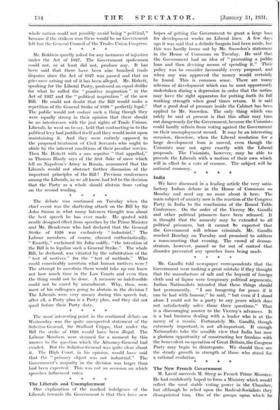Mr. Baldwin quietly asked for any instances of injustice under
the Act of 1927. The Government spokesmen could not, or at least did not, produce any. It has been said that there have been nine hundred trade disputes since the Act of 1927 was passed and that no grievance arising out of it has been alleged. Mr. Birkett, speaking for the Liberal Party, professed an equal dislike for what he called the " punitive inspiration " in the Act of 1927 and the " political inspiration " of the new Bill. He could not doubt that the Bill would make a repetition of the General Strike of 1926 " perfectly legal." The public would not endure such a thing though they were equally strong in their opinion that there should be no interference with the just rights of Trade Unions. Liberals, he went on to say, held that contracting-in to the political levy had justified itself and they would insist upon maintaining it. And they were entirely opposed, to the proposed treatment of Civil Servants who ought to abide by the inherent conditions of their peculiar service. Then Mr. Birkett with a non sequitur " that appalled," as Thomas Hardy says of the first flake of snow which fell on Napoleon's Army in Russia, announced that the Liberals would not obstruct further discussion of the important principles of the Bill ! Previous conferences among the Liberals, as we all know, had led to the decision that the Party as a whole should abstain from voting on the second reading.
* * * *






































 Previous page
Previous page